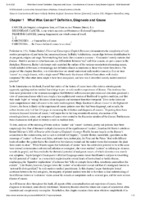Chapter 1 What Was Cancer? Definition, Diagnosis and Cause
Ravenous Natures
Author(s)
Skuse, Alanna
Collection
WellcomeLanguage
EnglishAbstract
The study of early modern cancer is significant for our understanding of the period’s medical theory and practice. In many respects, cancer exemplifies the flexibility of early modern medical thought, which managed to accommodate, seemingly without friction, the notion that cancer was a disease with humoral origins alongside the conviction that the malady was in some sense ontologically independent. Discussions of why cancer spread rapidly through the body, and was difficult, if not impossible, to cure, prompted various medical explanations at the same time that physicians and surgeons joined with non-medical authors in describing the disease as acting in a way that was ‘malignant’ in the fullest sense, purposely ‘fierce’, ‘rebellious’ and intractable.3 Theories seeking to explain why cancer appeared most often in the female breast similarly joined culturally mediated anatomical and humoral theory with recognition of the peculiarities of women’s social, domestic and emotional life-cycles. Moreover, as a morbid disease, cancer generated eclectic and sometimes extreme medical responses, the mixed results of which would prompt many questions over the proper extent of pharmaceutical or surgical intervention.
Keywords
cancer; early modernity; early modern cancer; england; early modern medical thoughtISBN
9781137569196;9781137487537OCN
1076646706Publisher
Springer NaturePublisher website
https://www.springernature.com/gp/products/booksPublication date and place
Basingstoke, 2015Grantor
Imprint
Palgrave MacmillanClassification
History of medicine


 Download
Download